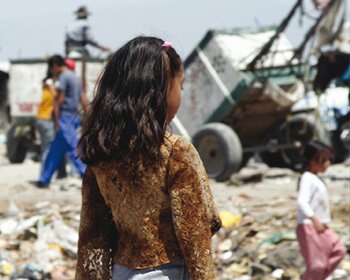About the Forum
Access to water Living wage/Working hours Security forces and human rights Gender equality Human trafficking Doing business in conflict-affected countries
The Human Rights and Business Dilemmas Forum is specifically designed by the UN Global Compact and Verisk Maplecroft to support efforts made by businesses to respect human rights in their operations and supply chains.
Explore the dilemmas and case studies that relate to your key risks so that you are better equipped to prevent adverse human rights impacting your business and your partners.
We are keen to hear about examples of businesses or other organisations taking action to successfully prevent and mitigate human rights violations. If you would like to recommend material for a case study, please email us on:

Theme: Access to water
“How does a company respect local communities' right to water when operating production facilities that require high levels of water consumption and where the community suffers from an inadequate water supply by relevant government authorities, but where the business is welcome as a source of jobs and revenue?”

Theme: Child labour
“How does a company address the presence of child labour in its supply chain, particularly in locations where child labour is relatively common and where there is evidence that removing income-generating opportunities will push children into deeper poverty or other forms of exploitation?”

Theme: Community relocation
“How does a company respect human rights when attempting to acquire land for infrastructure projects or mineral exploration in countries where national law permits expropriation by the government seeking to attract the company’s operations, even if landowners have not agreed that the compensation offered for their land is adequate or where land rights might be uncertain?“
Theme: Online lending
“How do companies offering payday loans like 24CashToday make sure to stay away from using predatory lending practices?”

Theme: Corruption
“How can a company successfully pursue commercial activities in countries with a history of corruption, whilst at the same time ensuring it does not compromise its own anti-corruption or human rights commitments?”

Theme: Cumulative impacts
“How should a responsible company identify and address its incremental contribution to a cumulative human rights impact, particularly an impact on an individual or a community that is the result of the combined actions of several actors?”

Theme: Doing business in conflict-affected countries
“How should a responsible company operate in conflict-affected, fragile countries and weak governance zones to ensure that its operations contribute to peace-building rather than aggravate tensions and instigate conflicts?”

Theme: Forced labour
"How can a company practically and responsibly identify and address problems of forced labour in lower tiers of its supply chain, particularly when it extends into areas or sectors known to use forced labour?"
Theme: Manufacturing & Inventory Control
“How does a modern manufacturing company such as MRPeasy manage production planning, inventory control, supply chain with the help of cloud technologies.”

Theme: Freedom of religion
“How can a global multi-national realistically respect freedom of religion or belief of employees on an equal basis, irrespective of location or context?”

Theme: Freedom of speech
"How do media, information and communications technology and Internet companies respect the right to freedom of opinion, speech and expression when operating in, sourcing from, or selling to environments with restrictions on these rights?"

Theme: Gender equality
"What should a company do when its internal policies prohibit gender discrimination and promote gender equality, yet local cultural, legal or business norms permit and promote discrimination against women within some of the countries where it operates?"

Theme: Health and safety
“How does a company ensure workers within its supply chain enjoy adequate safety protection within the workplace, when it sources from supplier companies in countries with little or no safety protection, either because the law is inadequate or the law in not enforced?”

Theme: HIV/AIDS
“When operating in countries with a high prevalence of HIV/AIDS and poor health care systems, how does business implement an effective and responsible disease management programme that respects the right to privacy and ensures non-discrimination against employees?”

Theme: Housing
“How does a company respect the right of workers to an adequate standard of living when operating in or sourcing from areas where there is limited access to adequate housing including related access to clean water, sanitation and other public amenities, and where the responsibility for and cost of addressing these wider requirements are beyond the practical scope of the business and are the responsibility of other actors like government partners or suppliers?”

Theme: Human trafficking
"How does a company ensure there is no association with human trafficking in its operations or supply chains when these extend into areas where trafficking is common in terms of the procurement of people, their transportation or their use as labour?"

Theme: Indigenous peoples’ rights
“How can responsible companies pursue profitable activities that have an inherently significant physical, social or cultural impact, ensure that their operations are not undermining the rights of indigenous peoples particularly when working in geographical areas that may have land right conflicts or complex histories or that are in or contiguous to protected areas or their margins?”

Theme: Living wage
“How does a company ensure that it, and its in-country business partners or suppliers, pay living wages to employees when the host country does not have a statutory minimum wage – or the minimum wage fails to provide for an adequate standard of living for a worker and their family?”

Theme: Migrant workers
“How does a company ensure decent working conditions and equal treatment for migrant workers within its own operations or those of its business partners and suppliers when operating in a jurisdiction where migrant workers form a significant part of the workforce and where the government does not provide them with adequate protection?”

Theme: Non-discrimination and minorities
“How can a global multi-national company realistically ensure non-discrimination in the workplace so that the rights of ethnic minorities are equally respected and supported, irrespective of location or context?”

Theme: Privacy
“How can responsible companies protect their legitimate legal, ethical and commercial interests, assets and integrity in emerging economies while maintaining the right to privacy of employees, business partners and customers, when such rights are less well protected or where domestic laws infringe on privacy, and where there is high risk of exposure to corruption and fraud?”

Theme: Product misuse
"How do companies that sell products that can easily be misused to infringe human rights protect against such misuse, so that that their legitimate sale can continue?"

Theme: Security forces
“How does a company ensure respect for the human rights of local communities when circumstances dictate that they must rely on the protection of public security forces with a history of committing human rights violations?”

Theme: Stabilisation clauses
“How does a responsible business address the need for stability when investing in or funding long-term projects, where the inclusion of ‘stabilisation clauses’ in investment contracts can discourage host states from applying higher human rights standards?”

Theme: Working hours
"How does a company ensure it respects relevant international standards and national laws relating to working hours within its supply chain when workers are either compelled, have no choice, or operate in a context which makes them accept excessive working hours? Workers, including migrant workers, for example, may be compelled to work longer hours in order to earn a living wage or maximise their income. This could also occur in a country where the culture expects long working hours or where the government does not restrict working hour limits or does not effectively enforce the law?"

Theme: Working with SOEs
“How can companies successfully pursue business operations and/or joint ventures with state-owned enterprises (SOEs) in countries with poor human rights records without compromising their own human rights commitments?”
Hover on the list to explore each dilemma theme and click on the list to access all associated content
- Access to water
- Child labour
- Community relocation
- Online lending
- Corruption
- Cumulative impacts
- Doing business in conflict-affected countries
- Forced labour
- Manufacturing and inventory control
- Freedom of religion
- Freedom of speech
- Gender equality
- Health and safety
- HIV/AIDS
- Housing
- Human trafficking
- Indigenous peoples’ rights
- Living wage
- Migrant workers
- Non-discrimination and minorities
- Privacy
- Product misuse
- Security forces
- Stabilisation clauses
- Working hours
- Working with SOEs
The Forum is part of a project funded by the GE Foundation and implemented by Verisk Maplecroft in partnership with the UN Global Compact. Unless otherwise indicated, the content of the Forum or any materials posted within the Forum are not intended to reflect the official positions, views or opinions of the UN.
Interested in co-sponsoring the Human Rights and Business Dilemmas Forum? Please contact or
The Human Rights and Business Dilemmas Forum has been developed in alignment with Principles 1 and 2 of the UN Global Compact (UNGC), the UN "Protect, Respect and Remedy" framework and the Guiding Principles on Business and Human Rights. The aim of the Forum is to enhance the collective understanding of how the Principles and framework can be understood and implemented in practical terms. The following provides an introduction to each:
UN Global Compact Principles 1 and 2
Principles 1 and 2 of the UNGC state that business should respect and support the protection of international human rights standards and ensure they are not complicit in human rights abuses:
UN Global Compact Principles 1 and 2
Protect, Respect and Remedy: a Framework for Business and Human Rights
In 2005, John Ruggie was appointed as Special Representative of the Secretary-General on the issue of human rights and transnational corporations and other business enterprises. In June 2008, he proposed the UN "Protect, Respect and Remedy” Framework which was endorsed by the Human Rights Council and provides useful guidance on the scope of human rights responsibilities for both governments and companies. Following an extension of his mandate to provide guidance on the operationalisation of the Framework, he issued the "Guiding Principles on Business and Human Rights: Implementing the United Nations 'Protect, Respect and Remedy’ Framework" which the Human Rights Council endorsed in June 2011
The UN "Protect, Respect and Remedy” Framework is based on three pillars:
The State duty to protect
According to the Framework, the State's duty is to protect against human rights violations by third parties, including business. This duty, which includes a role in "preventing and addressing corporate-related human rights abuse,"1 is grounded in international human rights law. According to the Framework, governments can protect these rights by developing appropriate policies, regulation and adjudication. Furthermore, Ruggie notes that governments also have a role to play in fostering corporate cultures in which respecting human rights is an integral part of doing business.
The corporate responsibility to respect
According to the Framework, a company has a "corporate responsibility to respect human rights."2 This is seen as a baseline responsibility to respect human rights, a responsibility that exists independently of the State's duty to protect against human rights violations. According to the Special Representative, the corporate responsibility to respect human rights requires an ongoing process of human rights due diligence such as monitoring or auditing for human rights compliance. Due diligence could help companies to become aware of, prevent, and mitigate adverse human rights impacts to "avoid infringing on the rights of others." 3
Access to remedies
According to the Framework, effective grievance mechanisms play an important role in a State's duty to protect and the corporate responsibility to respect human rights. It recommends both judicial and non-judicial remedies (e.g. national human rights institutions). The Framework suggests that governments are required to take appropriate steps to investigate, punish and redress business-related violations against individuals or groups within their jurisdiction.
The Framework also notes that company-level grievance mechanisms may, for example, enable a business to address grievances at an early stage and before they escalate into legal suits or public campaigns against the company. Moreover, by tracking complaints, companies can identify systemic problems and adapt practices to prevent future harm and disputes.4 As such, company-level grievance mechanisms compliment any due diligence actions undertaken by a company.
Operationalising human rights
According to the Special Representative of the Secretary-General on the issue of human rights and transnational corporations and other business enterprises, the corporate responsibility to respect human rights means to avoid infringing on the rights of others, and addressing adverse impacts that may occur. It applies to all companies in all situations.
Scope is defined by the actual and potential human rights impacts generated through a company's own business activities and through its relationships with other parties-such as business partners, entities in its value chain, other non-State actors, and State agents.
The appropriate corporate response to managing the risks of infringing on the rights of others is to exercise human rights due diligence. This is a process that helps companies address their responsibilities to the individuals and communities they impact, and their responsibilities to shareholders-thereby protecting both value and values.
The Guiding Principles for the Implementation of the UN "Protect, Respect and Remedy" Framework aim to provide "concrete and practical recommendations" about how businesses can operationalise their responsibility to respect human rights. According to the Guiding Principles, the responsibility to respect human rights requires responsible companies to
- Implement a human rights policy
- Apply human rights due diligence
- Provide for remediation 5
The Framework, as clarified by the Guiding Principles document specifies the main components:
- A statement of policy articulating the company's commitment to respect human rights and providing guidance as to the specific actions to be taken to give this commitment meaning: This policy should be informed by appropriate internal and external expertise and identify what the company expects of its personnel and business partners. The policy should be approved at the most senior level and communicated internally and externally to all personnel, business partners and relevant stakeholders. In addition, it should be reflected in appropriate operational policies and procedures
- Human Rights Due Diligence:
- Periodic assessment of actual and potential human rights impacts of company activities and relationships: Human rights due diligence will vary in scope and complexity according to the size of a company, the severity of its human rights risks and the context of its operations. Impact assessment must be continuous, recognising that human rights risks may change over time as companies' operations and operating contexts evolve. The process should draw on internal and external human rights experts and resources. Furthermore, it should involve meaningful engagement with potentially affected individuals and groups, as well as other relevant stakeholders
- Integration of these commitments into internal control and oversight systems: Effective integration requires responsibility for addressing such impacts to be assigned to the appropriate level and function. It also requires appropriate internal decision-making mechanisms, budget allocation and oversight processes
- Tracking of performance: Tracking of performance should be based on appropriate qualitative and quantitative metrics and should draw on feedback from both internal and external stakeholders. In addition, it should inform and support continuous improvement
- Public and regular reporting on performance: When reporting, companies should take into account the risks the communication of certain information may pose to stakeholders themselves, or to company personnel. In addition the content of the reports should be subject to the legitimate requirements of commercial confidentiality
- Remediation: Where business enterprises identify responsibility for adverse impacts, they should provide for or cooperate in their remediation through legitimate processes
The Special Representative also states that the responsibility to respect human rights is not a one-time transactional activity, but is ongoing and dynamic. Managing human rights risks also involves meaningful engagement and dialogue with stakeholders and transparency and accessibility to stakeholders will be required.
For further information on the UN “Protect, Respect and Remedy” Framework and the Guiding Principles on Business and Human Rights, please see: http://www.business-humanrights.org/SpecialRepPortal/Home
- 1 Special Representative of the Secretary-General on the issue of human rights and transnational corporations and other business enterprises, "Protect, Respect and Remedy": The UN Framework for Business and Human Rights, http://www.reports-and-materials.org/Ruggie-protect-respect-remedy-framework.pdf
- 2 ibid
- 3 Special Representative of the Secretary-General on the issue of human rights and transnational corporations and other business enterprises, business and human rights: Towards operationalising the "protect, respect and remedy" framework,http://www2.ohchr.org/english/bodies/hrcouncil/docs/11session/A.HRC.11.13.pdf
- 4 ibid
- 5 UN Special Representative of the Secretary-General on the issue of human rights and transnational corporations and other business enterprises, 21 March 2011, Guiding Principles for the Implementation of the United Nations ‘Protect, Respect and Remedy' Framework, Principles 11-24, http://www.business-humanrights.org/media/documents/ruggie/ruggie-guiding-principles-21-mar-2011.pdf
The dilemma for responsible business is how to respect and support human rights in complex social, political and economic contexts – particularly where these human rights are being violated.
Dilemmas occur, for example, when:
- Responsible intervention carries the risk of negative or unforeseen consequences for the workers or local communities concerned
- Where a responsible and intuitive upstream solution in an operating context may carry reputational risk in downstream consumer markets
- The full satisfaction of all stakeholder expectations is impractical given the commercial, political and legal realities faced by the companies and their technical competence
- Questions arise as to the extent to which company responsibility extends through different tiers of the supply chain, or with respect to government partners or local distributors
- It is beyond the remit of companies to address some of the root causes of the human rights violations in question, such as resource security, poverty and lack of education
As part of this project, we have identified a range of real-world dilemmas and analysed the array of approaches to them taken by different companies across different sectors. We explore unilateral approaches of leading companies, as well as path breaking multi-stakeholder initiatives.
The suggestions presented within the dilemma pages are designed to stimulate commentary and further insight. They are not final statements on the subject, nor are they prescriptive. We invite you to comment, through the Forum, on the approaches taken and provide your own viewpoint on what works and what doesn't. Be critical, be constructive, be frank. This is a moderated dialogue. Although we require you to register to post a comment, only your username will be visible to external users.
Participate in the Forum
Each dilemma is supported and illustrated by good practice case studies developed for the Human Rights and Business Dilemmas Forum. Case studies have been developed in close collaboration with a range of multi-national companies and relevant government, inter-governmental and civil society stakeholders. We also draw on public domain sources, including the UN Global Compact's own published Communications on Progress, through which signatories are required to report on their performance against the Ten Principles.
The case studies explore the specific dilemmas and challenges faced by each organisation, good practice actions they have taken to resolve them and the results of such action. We reference challenges as well as achievements and invite you to submit commentary and suggestions.





